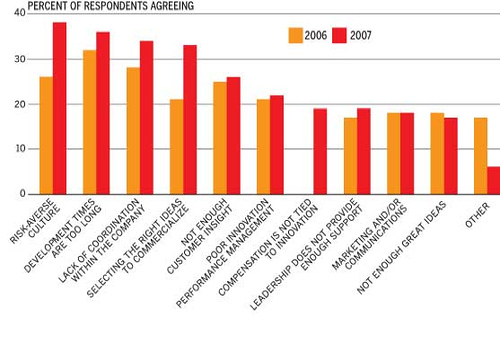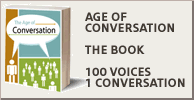
Results for articles with tag 'accountplanning' (6 total)
Sometimes it works just like this, most of the time it doesn't. The process isn't perfectly linear, nor should it be. In an ideal world, it should be about continuous conversations, with planners regularly thinking of new ways to add something.
Years back I remember a planner at Mullen telling me how they came up with the Monster.com campaign. In a discussion about the brand, some planners mentioned having done groups with kids for Disney where questions about future career choices were a part of the discussion. The creatives mentioned they would like to see the tapes and from that viewing, this idea was born.
Anyway that's the folklore behind it, if anyone one knows anything different, please let me know.
The point here is that planners have to do the research, write great briefs, but they also need to remain part of and contribute to the creative conversation, knowing all along just what it takes to get to an interesting idea.
Posted by Ed Cotton
I wonder if it's possible to create rich experiences using the same reductive strategic model?
The same one that's used to create advertising.
I am sure you can't.
The world of classic communication is all about being reductive. We talk about funnels, filters, core propositions, single minded ideas, USPs.
It's all about distilling the essence down to a single thought and working from there.
It's all about creating a smart bomb meme that can puncture mass culture.
It starts with the question.
What can we do to get people to pay attention to us?
If you look at the world of experiences, the question is very different.
What experience(s) can we create to delight the user?
These questions are radically different and represent two very different worlds.
Artist vs. Team
Ego vs. Teamwork
Ownership vs. Sharing
Single idea vs. Multiple ideas
Single layer vs. Deep layers
Disrupt life vs. Integrated into life
I am not saying that advertising is going away anytime soon, but it's very clear that we are moving into an era where our clients are looking to us to create experiences for their brands. Those things no longer look like advertising, and as a process it requires new tool sets.
It starts to look more like product design that anything else.
The demands on Strategy/Planning are therefore significant.
We aren't looking for language anymore, we want to deeply understand needs and behaviors if we want to create experiences that matter.
This is no about distillation, but an exploration of reams of potential possibilities.
Posted by Ed Cotton
An Influx interview with can be found here.
There were drinks, Alex read some passages from the book and on a wall in the gallery there was this board full of stuff.
Since Alex's book "Punching In" is all about the world of a brand from an employees perspective. For the book, Alex worked at The Gap, Apple, Starbucks, Enterprise and UPS over a two year period to learn their secrets and internal brandwashing techniques.
In the process, he collected a number of artifacts from his experience including; uniforms, badges, rule books, guides and pay slips, some of which were dispayed on the board.
It was a nice example of cultural curation (idea by Grant McCracken) where the physical elements and artifacts that define a culture are collected and understood.
It's something planners could be doing more of. We tend to do a lot of talking to people and not a great deal of looking and observing. If we looked deeper and picked up and documented more fragments it might lead to some richer insight.
Posted by Ed Cotton
Posted by Ed Cotton
As usual, it was a great with lots of interesting stimuli and conversation, congrats to the organizers, especially the co-chairs Catrina McAuliffe and Suzanne Powers.
Firstly, I want to acknowledge a couple of observations and glaring omissions from the presentation on blogging that Aki and I made on Tuesday.
1. We shouldn’t have had blogging in our title- it was a turn off- I heard that some people decided not attend because they thought it would be too technical.
2. We failed to acknowledge one huge problem that our research didn’t uncover and only dawned on me during the conversations that happened after the presentation. For many planners, it’s not that they aren’t motivated and ready to blog; it’s their agency systems that conspire against it. Bureaucracy appears to be holding back many voices. One big system agency has taken 9 months to write a brief for its blogging initiative.
3. Toolset- We gave a good roadmap for people for those who already have a blog and want to make it better, but we didn’t do it for people who want to get started. They are similar, but have subtle differences. I want to work on that, so stay tuned.
My big take away from the conference was the critical importance of toolsets and/or having strong philosophy about the world and our world because you can shape your agency around it.
It was in Stephen Walker of Headmint’s presentation, it was all over Eat Big Fish’s and expressed as suggested by Zeus Jones, who shared a philosophy, this is something that most agencies don’t have, it describes, not just how they see the world, but also what they plan to do about it.
All the great thinking in the world counts for nothing unless you have platform that can help generate and use it.
The “toolset” is the pathway that helps generate thinking and turns thinking into something. Adam Morgan’s all seeing Third Eye would be meaningless without a pathway that can help you mine, extract and use observation and ideas.
This is critical because today the chances of the “Lone Wolf Guru” identifying and implementing a brilliant idea on his or her own inside an organization are less than zero.
It was clear from the conference that we’ve entered the age of collaboration, both inside clients and agencies, something that can only succeed with new sharing and learning tools.
It’s clearly incumbent on all planners to develop toolsets beyond the creative brief that help them work with others to generate powerful insight to create new ideas to transform a client’s business.
The more structured the process, the better the results will be.
Finally, back to the subject of the conference, here are 5 pieces of advice for next year’s conference committee, if they choose to listen.
1. Get more people up onto stages- shorter sessions and more of them- think Barcamp and snack-sized 10 minute shows
2. More diversity- Fewer white male ad planners with British accents and more planner practioners from new worlds like usability, connections planning and design
3. Keep bringing in the inspiring showmen-as long as they have a great and relevant story to tell- more Sir Kens and more Eric Ryans
4. Bring some diverse thinkers into the breakouts -writers, photographers, designers, architects, artists and people from the non profit world- this new planning generation wants to do good
5. Add workshops where planners get to do something as giant teams- attack a problem- like how to make the conference better!
Posted by Ed Cotton
The barriers aren’t exactly what you expect them to be, for example, clients don’t seem to have a problem generating the ideas, it’s the implementation that’s the issue.
Clients need help in areas beyond the creative generation of the ideas themselves.
Specifically, clients want help in the following areas...
- Becoming more comfortable with risk
- Streamlining the internal co-ordination process
- Identifying the right opportunities
- Bringing relevant consumer insights to the table
It appears clients want strategy and process, more than creativity a notion that runs counter to the thinking at most communication agencies.

Articles for tag accountplanning (6 total).
